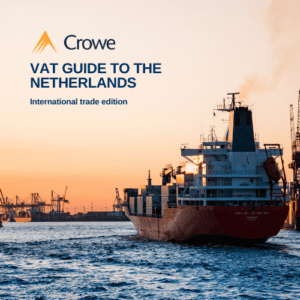Doing business in the Netherlands: Where to start and what to consider


Crowe Peak takes pleasure in assisting clients in navigating the realms of finance, technology, law, and organizational matters. This is particularly true when clients are dealing with issues of international significance. In this article, we guide you through the ins and outs of conducting business in the Netherlands for international companies. We cover essential aspects ranging from the business climate and registration requirements to legal structures and tax regulations.
Netherlands: economy and politics
The Netherlands is situated in northwestern Europe and boasts a population exceeding 17.5 million. It operates as a constitutional monarchy, with the king serving as the head of state, devoid of political responsibilities that would render him politically accountable to parliament. The nation is divided into 12 provinces, each possessing its own local government. The Dutch judiciary is under central regulation. Since 2010, the Netherlands has been part of the Kingdom of the Netherlands, alongside the islands of Aruba, Curaçao, and St. Maarten. Meanwhile, the islands of Bonaire, St. Eustatius, and Saba maintain a distinct status as part of the Caribbean segment of the Kingdom.
The Netherlands operates as an open economy influenced by global economic trends. Factors such as international economic or financial crises, along with global events like Brexit and the Ukraine conflict, impact the Dutch economy, particularly in the realm of exports due to shifts in global trade. Nonetheless, companies based in the Netherlands tend to maintain a generally favorable financial position in terms of profitability and solvency. As a result, they often exhibit resilience in the face of fluctuations in the global economy and stock markets. Euronext Amsterdam, situated in the Dutch capital of Amsterdam, is the stock exchange that plays a crucial role in the country’s financial landscape. Since January 1, 2002, the euro has been the sole legal tender in the Netherlands.
The Netherlands as an export center
The Netherlands’ advantageous central coastal location, combined with its robust financial environment, has propelled it into a prominent role as a major import and export hub in Europe. Key industrial sectors in the Netherlands encompass oil refineries, chemicals, food processing, and the production of electronic goods. Among the Netherlands’ primary import partners are Germany, Belgium, Luxembourg, China, the United Kingdom, France, and the United States. These same countries, alongside Italy, serve as the primary export partners for the Netherlands.
The Dutch Central Bank
The Dutch Central Bank (De Nederlandse Bank or “DNB”) functions as the central bank in the Netherlands. One of the primary objectives of the Dutch government is to maintain price stability and effectively control inflation. Private Dutch banks offer an extensive array of financial services, with some specializing in specific areas, while others have a broader focus within the banking sector. Dutch banks are renowned for their reliability, as most financial institutions employ organizational structures designed to avoid conflicts of interest. The comprehensive prohibition on commissions also contributes to this trustworthiness. Furthermore, Dutch financial institutions operate under rigorous Dutch and European regulations, particularly in the domains of money laundering prevention and the thwarting of terrorist financiën.
Operating in The Netherlands as an existing foreign company
Foreign companies aiming to conduct business in the Netherlands can establish their existing foreign legal entity in the country without the necessity of converting it into a Dutch legal entity. In this arrangement, the company operates as an extension of its foreign parent company while maintaining a certain level of independence. However, they must navigate both international and Dutch regulations. All foreign companies with branches in the Netherlands are required to complete registration with the Chamber of Commerce (Kamer van Koophandel).
Starting a business in The Netherlands
According to Dutch law, a foreign individual or company can engage in business activities in the Netherlands either by setting up a subsidiary or by incorporating a Dutch legal entity. Dutch company law offers a flexible and permissive framework for organizing these subsidiaries or branches. There are no specific restrictions on foreign entrepreneurs conducting business in the Netherlands. Business operations can take place in the Netherlands by establishing a legal entity in various forms, with or without legal personality. If a legal entity possesses legal personality, the entrepreneur’s liability is limited to the amount they have contributed to the company’s capital. Further information about different legal forms in the Netherlands and the concept of legal personality can be found in our comprehensive article regarding legal forms. Below, you will find more details about the process of establishing and operating subsidiaries and branches in the Netherlands.
Branches and subsidiairies under Dutch Law
A branch office in the Netherlands does not constitute a distinct legal entity. Instead, it serves as a permanent establishment through which a company conducts its business activities. Consequently, the company establishing a branch in the Netherlands bears liability for claims arising from the branch’s actions.
On the other hand, a subsidiary, regardless of its legal form, functions as a separate legal entity. It can be formed by one or more shareholders and is subject to control by the parent company. Various legal forms are possible; further details can be found here. Typically, control over a subsidiary is achieved when the parent company owns over 50% of the subsidiary’s shares. However, there are circumstances where control can be established through special voting rights or the diversity of other shareholders. These shares or rights grant the parent company the authority to determine the composition of the subsidiary’s board of directors and, consequently, exercise control.
“Structure companies”
In this article, you will find comprehensive information about the Dutch legal forms “BV” (limited liability company) and “NV” (public limited company). Additionally, it is important to note that under Dutch law “large” BVs and NVs, are subject to the so-called legal “structure regime”. The structure regime is applicable when certain conditions are met for a continious period of three years. These conditions include:
- The issued capital, reserves, and retained earnings must amount to at least 16 million euros, as per the balance sheet.
- The company, or another company in which it holds a majority stake, has established a works council (OR) in accordance with the legal requirements (Works Council Act).
- At least 100 individuals are employed in the Netherlands within the dependent companies and the company itself.
If the company satisfies these requirements, it must be categorized as a statutory two-tier company, subject to the applicable laws and regulations governing such entities. An exception applies if the entire capital is provided by a single natural person (not a legal entity).
Unless an exemption is applicable, a structure company in the Netherlands is obliged to appoint a supervisory board with specific powers, including:
- The authority to appoint or dismiss the board of directors.
- Approval of significant changes related to governance, such as proposals to amend the articles of association, dissolve the company, issue new shares, and increase the issued share capital.
- Approval of new supervisory directors. Please note that while shareholders have the opportunity to recommend individuals for nomination as supervisory directors, there is no obligation for the supervisory board to follow these recommendations.
The supervisory board must consist of a minimum of three supervisory directors. It is worth mentioning that the structure regime is not mandatory for companies whose holding company is based in the Netherlands, but the majority of their employees work abroad. However, such multinationals have the option to voluntarily adopt the structure regime.
For advice on structure regimes, Crowe Peak’s specialists are ready to assist you. You can ask your question directly by sending an email.
Need advice on structure regimes?
Check out our services and find out what we can do for your business.
Trusts in the Netherlands
A distinctive legal entity in international business is the trust. According to Dutch civil law, this legal structure is unknown. Nevertheless, the Netherlands has ratified the Hague Convention on the Law of Trusts and the Recognition of Trusts that Fulfill Specific Formal Conditions. For the trust to be recognized, it must be documented, actively established, and not solely dedicated to assets located in a jurisdiction other than the trust’s governing law. If you require guidance on the intersection of the Netherlands and trusts, our legal experts are here to provide assistance.
UBO register
A crucial element of Dutch company law that requires your attention when conducting business in the Netherlands is the obligatory registration of the “Ultimate Beneficial Owner” (UBO). In essence, it is vital to acknowledge that, in compliance with European anti-money laundering regulations, the individual who holds ultimate control over a company (the UBO) must be registered with the Chamber of Commerce.
Statutory audit requirement
A company in the Netherlands is obligated to subject its financial statements to an audit if it satisfies specific criteria stipulated by law. The Netherlands adheres to Article 2:393 of the Dutch Civil Code (hereinafter “DCC”) to regulate the requirement for auditing financial statements. The primary criteria for determining the auditing mandate depend on the company’s size.
Size criterion:
An enterprise is classified as large if, for two consecutive fiscal years, it fulfills two of the following three criteria:
- Balance sheet total: more than 6 million euros.
- Net sales: more than 12 million euros.
- Average number of employees: more than 50.
Should a company, previously subject to an audit, no longer meet these criteria for two consecutive years, it is no longer bound by the statutory auditing requirement. In the Netherlands, listed companies are mandated to prepare financial statements in accordance with IFRS. Non-listed companies may voluntarily choose to prepare financial statements based on IFRS.
Important to note: If a small non-listed company opts to prepare financial statements based on IFRS, they forfeit the exemption under Article 2:396 DCC. This exemption allows them to publish a condensed balance sheet with explanatory notes and relieves them of the audit obligation. Consequently, such a company automatically falls under the “large” category and is subject to auditing requirements. If you require guidance on this matter, please do not hesitate to reach out to us.
The audit requirement and public interests organizations
The audit requirement entails that external auditors must review the company’s financial statements. This practice is designed to ensure the credibility of financial information and safeguard the interests of investors, creditors, and other stakeholders.
In the Netherlands, audit firms must be licensed under the Dutch Audit Firms Supervision Act (WTA) to carry out statutory audits. Within the country, two categories of licenses exist: the OOB license for organizations of public interest, which includes banks, insurers, and listed companies, and the regular (non-OOB) license.
Crowe Peak holds a standard WTA license, and we are well-prepared to assist with the auditing of your organization’s financial statements. For more information about our audit and assurance services, please visit our dedicated page.
Intellectual property
Another noteworthy aspect of legislation to consider when conducting business in a new country is intellectual property law. In the Netherlands, this includes the Benelux Convention on Intellectual Property. This treaty encompasses the protection of trademarks and designs in the Netherlands, Belgium, and Luxembourg. A registered trademark enjoys protection for ten years from the registration date, with the possibility of a ten-year extension. Renewal necessitates an application process and the payment of all associated fees. The lawful owner holds the right to seek damages for any infringement of their rights, such as unauthorized trademark use by another party.
A design pertains to the novel appearance of a consumer product. A registered design is safeguarded for a period of five years from the date of registration and can be renewed for four additional five-year terms, for a maximum total of 25 years. Renewal takes effect upon the timely settlement of all relevant fees. The rightful owner retains the right to claim damages for any violation of their rights, including the use of the design or model by another party.
Grants and funding
The Dutch government offers various forms of support to promote sustainability and innovation in businesses. This includes a wide range of subsidies and financing options. We will provide an explanation of some of these below.
Guarantee for SME loans (Borgstelling MKB-kredieten or “BMKB”)
The BMKB is a Dutch scheme designed to facilitate small and medium-sized enterprises (SMEs) in accessing financing. It does so by providing a government guarantee to financial institutions like banks and lenders. The aim of the program is to encourage and facilitate lending to SMEs, helping them sustain their operations, grow, and preserve jobs. To enhance financing opportunities for sustainability initiatives by SMEs, a green component known as BMKB-G has been introduced.
Innovation Credit (Innovatiekrediet)
The Innovation Credit is a financial scheme aimed at supporting innovative companies in the development and realization of groundbreaking technologies, products, processes, or services. It offers financial assistance for high-risk projects that may be challenging to finance due to their high level of innovation and uncertain outcomes.
Enterprise Finance Guarantee (Garantie ondernemingsfinanciering or “GO”)
The GO is a program designed to assist companies in securing financing by providing a government guarantee to financial institutions, such as banks and lenders. The GO scheme is particularly beneficial for companies facing challenges in obtaining financing due to economic circumstances, risky projects, or other reasons.
WBSO: Tax scheme for research and development
The WBSO scheme, which stands for “Wet Bevordering Speur- en Ontwikkelingswerk”, supports innovation in businesses by providing financial aid for research and development (R&D) work. This scheme reduces the costs associated with R&D projects, promoting innovation and technological development. It offers a tax benefit through the reduction of labor or other costs, including the purchase of materials.
Energy Investment Allowance (EIA) for entrepreneurs
The Energy Investment Allowance (EIA) is a Dutch tax scheme aimed at encouraging companies to invest in energy-saving technologies and sustainable energy generation. Businesses can benefit from this program by deducting a percentage of the investment cost for energy-saving and environmentally friendly technologies from their taxable profit. The EIA applies to investments in technologies like heat pumps, solar panels, wind turbines, and biomass installations.
MIA and VAMIL for Entrepreneurs
MIA, which stands for Environmental Investment Allowance, enables companies to gain a tax advantage by deducting a percentage of the cost of approved environmentally friendly technologies and assets from their taxable profits. These technologies and assets contribute to environmental protection and sustainability. VAMIL, or Free Environmental Investment Depreciation, provides flexibility in the depreciation process, allowing companies to realize financial benefits from their investments in sustainable technology more quickly.
Please note that the details of these schemes may change annually, and specific conditions and criteria apply. If you are interested in these programs, please reach out to us, and we can provide you with up-to-date and detailed information.
Accelerated Climate Investment Industry (VEKI)
In the context of sustainability and the energy transition, many industrial companies are taking CO2-saving measures. While they often bear the costs themselves, certain investments with a payback period longer than 5 years may be eligible for the VEKI scheme in the Netherlands. This grant supports investments in market-ready devices, systems, or technologies, covering areas such as energy efficiency, recycling and waste reuse, local infrastructure, and other CO2 reduction measures.
Tax law
The tax system of a country is consistently a critical consideration when assessing a favorable location for businesses. For years, the Dutch government has maintained the perspective that the tax system should not pose a significant impediment to companies seeking to establish themselves in the Netherlands. Additionally, the Netherlands has entered into tax treaties with numerous other countries to prevent double taxation. Furthermore, the Dutch tax system offers several noteworthy advantages to internationally operating companies, including:
- The Netherlands features relatively advantageous corporate tax rates for both small and large enterprises.
- In most instances, profits received by the Dutch parent company from foreign subsidiaries are exempt from taxation in the Netherlands, under the participation exemption.
- The Netherlands provides an appealing tax-free benefit through the 30% ruling for certain foreign employees working temporarily in the country.
Nevertheless, it is essential to recognize that the fiscally favorable environment for establishing a presence in the Netherlands also carries potential drawbacks, as it may be susceptible to exploitation for tax avoidance. Largely due to significant international and national political pressures, the Dutch government is currently intensifying its efforts to combat companies and individuals who have established or seek to establish tax avoidance schemes through the Netherlands, with the aim of discouraging such practices.
Measures against tax avoidance in the Netherlands
The Netherlands has aligned with the Organization for Economic Cooperation and Development’s (OECD) BEPS (Base Erosion and Profit Shifting) project, which is designed to counteract tax avoidance and profit shifting through international collaboration and the rectification of undesirable tax practices.
Furthermore, in the fight against tax avoidance, the introduction of various European anti-abuse laws has been accompanied by the implementation of a Controlled Foreign Corporation regime since 2019.
Moreover, commencing in 2021, a conditional withholding tax on interest and royalties will come into effect, and negotiations with the tax authorities for transactions involving companies located in countries on the Dutch list of low-tax nations or the EU list of fiscally non-cooperative jurisdictions will no longer be feasible. Low-tax countries are those characterized by an income tax rate of less than 9%.
VAT
The Dutch VAT system is anchored in Directive 2006/112/EC, the European Union’s unified framework for value-added tax (VAT). Under this system, taxation is imposed at every stage of the production process and during the distribution of goods and services. Taxable entities, primarily VAT-registered businesses, levy VAT on the goods and/or services they provide to one another. The entity charging VAT is responsible for remitting the VAT amount to the tax authorities. When VAT is assessed to a taxpayer, they are entitled to reclaim this VAT if they engage in activities subject to VAT. Consequently, this setup ensures that the ultimate consumer bears the responsibility for settling the VAT.
Foreign taxpayers conducting taxable activities in the Netherlands are typically also accountable for VAT. They are required to remit the applicable VAT in the Netherlands, thus allowing them to seek reimbursement of the VAT charged by other taxpayers. The VAT system involves formal invoicing regulations. As a fundamental guideline, VAT returns are typically submitted on a quarterly basis. However, under certain circumstances, such as upon request or as a consequence of late payment, entities may need to file returns monthly or annually. For services and goods transferred from one European Union member state to another, an intra-community listing must be submitted.
Would you like to gain a deeper understanding of VAT? Read more here. Alternatively, for specific inquiries, you can reach out to our tax specialists.
Excise
The Netherlands imposes excise taxes on alcoholic beverages, tobacco, fuel, and various mineral oils. Manufacturers, traders, and importers are responsible for paying these excise taxes to the tax authorities. Excise taxes are typically applied in addition to the standard VAT and are designed to govern the consumption of specific products. It is worth noting that the Excise Tax Act in the Netherlands is in complete alignment with the relevant EU directives.
Environmental tax
Various environmental taxes are levied in the Netherlands to encourage environmentally friendly behavior and reduce negative impact on the environment. Some examples of environmental taxes in the Netherlands are:
- Tax on tap water;
- Waste tax;
- Coal tax; and
- Energy tax.
Personnel in The Netherlands
Finding and retaining staff are essential prerequisites for the survival and expansion of any organization. A company’s workforce is a key factor that sets it apart. Dutch tax law offers several opportunities to incentivize and reward employees in a tax-efficient manner. Furthermore, Dutch law contains various provisions aimed at safeguarding the rights and responsibilities of both employers and employees in the Dutch labor market. Generally, both the employer and the employee are expected to adhere to the standard of a good employer and a good employee, respectively. Employers have specific legal obligations concerning working hours, rest periods, leave, and working conditions. Moreover, numerous mutual responsibilities are outlined in collective labor agreements (CAOs) and individual employment contracts.
Other ways to employ personnel
Under Dutch law, three main types of contracts are employed to establish the rights and obligations of individuals engaged in work for another party. The most common agreement is the employment contract. The assignment contract, such as a freelance agreement, consulting agreement, or management agreement, is often used in an attempt to distinguish it from an employment contract. The third type is the contracting agreement, which is entered into when the primary purpose of the work is the construction of a tangible item. The fundamental characteristics of an employment contract include:
- The requirement to provide personal labor.
- Compensation in exchange for wages.
- The authority of the other party to provide instructions on how the work is to be carried out.
Other contracts may lack one or more of these characteristics. The employment contract itself is not bound by formal rules (oral agreements are perfectly valid, although proof issues may arise). For more information about Dutch employment law, click here. If you have questions about Dutch works councils, continue here .
It is essential to note that Dutch employment law is highly intricate and specialized. Therefore, when in doubt, seeking professional advice is almost never an unnecessary luxury. Do you have a labor law inquiry? Fill out this form, and our legal experts will reach out to you.
Unions
Although the influence of trade unions is generally declining in the Netherlands, trade unions are still well organized in the manufacturing and semi-public sectors. The main trade unions are the Christelijk Nationaal Vakverbond (CNV) and the Federatie Nederlandse Vakbeweging (FNV). The main employers’ organization is VNO-NCW.
Employment of foreign nationals
Employees from the European Union, EEA countries (Norway, Iceland, and Liechtenstein), and Switzerland are not required to obtain a special permit to work in the Netherlands. However, to work legally in the Netherlands, employees must obtain a work permit (TWV) or a combined residence and work permit (GVVA), depending on their specific work situation. Under the Foreign Nationals Employment Act, it is the employer’s responsibility to apply for the residence permit. Various types of permits are available, including those for regular employment, highly skilled migrants, European blue card holders, teachers, (guest) lecturers, trainee doctors, or scientific researchers. In cases where multiple permits may be applicable, the employer must make a selection. Highly skilled migrants without an employer have the option of obtaining a permit for a search year, which grants them the right to seek employment as a knowledge migrant within one year.
Would you like to learn more about the process of hiring foreign employees in the Netherlands? Get in touch with our Global Mobility Services & Payroll department.
Minimum Wage and Minimum Holiday Allowance Act (WML)
The minimum wage in the Netherlands is regulated by law to ensure that workers receive a fair income and to prevent poverty and exploitation. The minimum wage is established in the Minimum Wage and Minimum Holiday Allowance Act (WML), which mandates the minimum wage employers must pay their workers. It is important to note that the minimum wage is tiered based on the age of the employee, with younger workers (those under 21) entitled to a lower minimum wage.
Starting on January 1, 2024, the statutory minimum hourly wage will be introduced, and the fixed minimum monthly, weekly, and daily wages will be phased out. This change aims to ensure that no sector has a lower minimum hourly wage than another.
The transition to the minimum hourly wage system may require adjustments to be made in collective bargaining agreements and employment contracts to align with the new legal framework. It may also necessitate modifications to payroll systems. For more information on this topic, consider subscribing to our newsletter (located at the bottom of this article) or reaching out to us directly.
Corporate social responsibility, ESG, CSR and sustainability
The Corporate Sustainability Reporting Directive (CSRD) is a significant initiative within the European Union (EU) aimed at enhancing the transparency and uniformity of corporate sustainability reporting.
The CSRD serves a dual purpose: firstly, to provide investors with dependable and comparable information to facilitate informed sustainable investment decisions, and secondly, to incentivize companies to adopt and implement sustainable business practices, fostering the transition towards a greener and more socially responsible economy.
This is accomplished by expanding the reporting scope to encompass a broader range of companies and establishing binding regulations on the required information for reporting. Consequently, sustainability reports are not limited to publicly listed companies; large companies will also be mandated to disclose sustainability reports starting with the fiscal year 2025.
In the Netherlands, a company qualifies as “large” if it satisfies two out of the following three conditions for two consecutive years:
- A balance sheet total exceeding 20 million euros.
- Net sales surpassing 40 million euros.
- Employment of over 250 persons personnel.
The CSRD introduces new sustainability reporting mandates, potentially requiring companies to disclose information on topics like climate change, biodiversity, social and human rights issues, corporate governance, and remuneration policies. The European Financial Reporting Advisory Group (EFRAG) has formulated the inaugural set of European Sustainability Reporting Standards (ESRS) to fulfill these requirements. This initial set was endorsed by the European Commission on July 31, 2023. In developing the ESRS, an effort was made to harmonize standards by drawing from existing global frameworks, including the Sustainability Accounting Standards Board (SASB) and the Global Reporting Initiative (GRI).
The CSRD signifies a crucial advancement in promoting sustainability and transparency within the EU, laying the groundwork for more accountable and sustainable business practices. It also contributes to the global endeavor for a more sustainable future. Companies should prepare for these new reporting demands and develop strategies to comply with them, details of which can be found in this comprehensive overview article.
Useful addresses for entrepreneurs doing business in The Netherlands
Looking for information from the Dutch Tax Authority? Want to know where to find information regarding subsidy applications? In need for contact details of the Chamber of Commerce or other agencies? Download a list of relevant data here.
Crowe Peak: Your partner across borders
The aforementioned overview is not exhaustive. You might have further inquiries about conducting business in the Netherlands. Our experts are readily available to assist you with these inquiries, even when they pertain to matters transcending Dutch borders. There is a reason we are part of a global network of accounting firms spanning over 150 countries. You can get in touch with us directly or subscribe to our newsletter (find the subscription link at the bottom of this page) for additional information.
You can get in touch with us directly by clicking the button below or subscribe to our monthly newsletter at the botom of this page.
Related knowledge
Curious to see what we can do for your organization?
Let’s meet!





